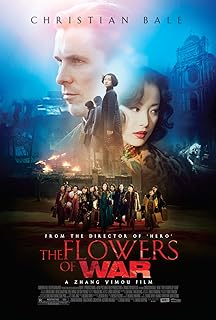電影訊息
電影評論更多影評

2011-12-19 03:32:00
英文評論
On The Flowers of War
"He who watched The Flowers of War without convulsion in himself can only be a bloody animal or a cold Japanese."
————An Audience
Before watching this extraordinary Zhang Yimou Film, I read a professor from Tongji University's comments: a combination of blood, porn and violence that is only want of commercial advertising. Now, I can hardly understand his and some others' comments on such an artifact.
Some may argue that it is a mere combination of blood, porn and violence. However, I saw Japanese cruelty and Chinese morality. And I can imagine more of these. An artifact can veil its aesthetics in any form of expression that can be tasty, can be funny, can be bloody, or even can be horrible. I don't believe so called blood, porn and violence in the movie is a simple combination, it is rather, a skillful tackle. War, to any degree is of great cruelty, the reality that the film is based on and elevates itself over.
Some say this film has no climax, which as far as I see, is a sheer misunderstanding of the film. It has several climaxes which gives audience hyper-drive from the very beginning to the end. The first is the death of Soldier Li who fought to his last drop of blood to save the students, mansifesting that one can die a heavy death, heavier than Mount Tai. He died for patriotism. The second climax appeared at the death of Dou, a prostitute who was gang-raped by Japanese soiliers. Her 「folly」 was that she wished to play a beautiful tune for a dying young soldier. She died for love. The third climax arrived at the prostitutes (including one boy student) determination to attend Japanese celebration of conquer of Nanking, repalcing the students who were virgins. Though their fate was known from the film, I can hardly associate their fate with survival, for ,as Moyu, the heroin said: 「After tonight my body shall never belong to myself.」 The last climax appeared at the end of the film, John successfully carried the students out of the hell. He saw brightness and his tears flooded. This scene, happy and tragical at the same time, reminded the previous sacrifices, deaths for patriotism, deaths for love, and most importantly, deaths for humanity. It is out of these superpositional death that lifted the children out of this living hell, and they are like ocean waves beating the shore again and again, waking up our souls.
Unlike Lifetimes Living, Zhang’s another moive which pictured the evolution of Chinese society, The Flowers of war just gave us a single scene of Nanking Massacre, which in profile give our imagination full space, leading us to ponder over many things.
Many audience cried during and after the film, but I held my tears and let them pour into my blood. Anger, convulsion, and respect mixed together in my body and pieced my nerves. I thus only wanted to write something for those Chinese people who died in Nanking Massacre. I believe, any intentional misleading and hyperbole disfurging critism on this film will be as pale as a piece of paper. 舉報
評論

